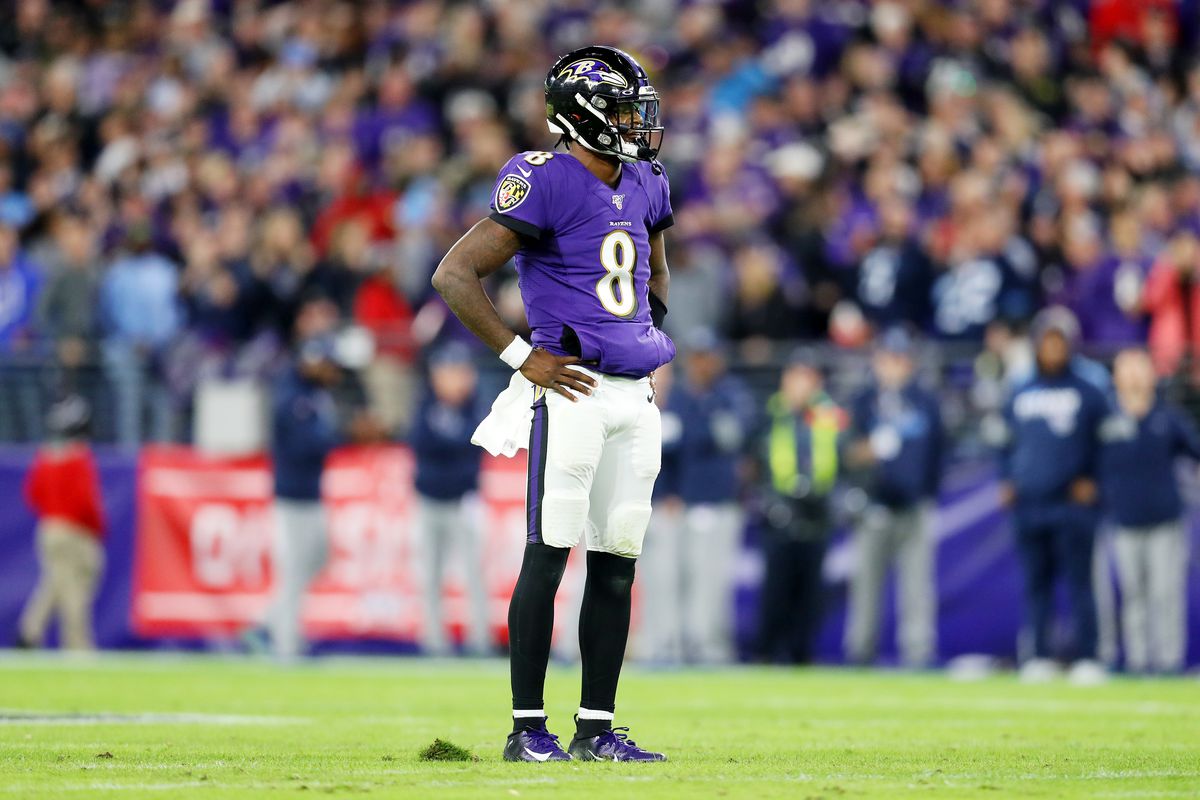So that’s that.
Despite the fanfare, hype, projections, eye-popping numbers, yards gained and touchdowns scored, the top-seeded Ravens lasted exactly one game and two weeks longer than their AFC North counterparts, losing in ugly, disjointed fashion to the plodding, methodical, sixth-seeded Tennessee Titans and mammoth running back Derrick Henry (why isn’t this guy promoted as the best back in the NFL?) The Ravens looked slow and confused most of the evening, and if a coherent game plan existed, it surely didn’t show up on the field. Needless to say, there were plenty of failures to carry this team swiftly into the offseason.
The ridiculous volume of offensive statistics compiled in this game (31 of 59, 365 yards, 1 TD, 2 INTs; 20 carries, 143 yards, 1 FL) by Ravens QB Lamar Jackson perhaps told the story of the entire Ravens season – one guy willing his team down the field repeatedly, often with little help from other skill positions, and a defense ill-equipped to stop an efficient, clock-killing running game. Jackson’s turnovers surely didn’t help matters, but neither did poor games collectively by his receiving corps, coupled with virtually no other rushing threat than Jackson himself doing anything of note. Hobbled tailback Mark Ingram III probably should’ve remained sidelined, and backup Gus Edwards was a non-factor, but it should also be noted the Ravens handed the ball off a total of nine times (excluding Jackson’s 20 carries, most of which were the result of broken passing plays), which, for a game that was relatively close through halftime, is simply inexcusable for a franchise that set numerous rushing records during the regular season. No matter how otherworldly Jackson’s game can sometimes appear, he simply can’t do it all by himself – tough to imagine the coaching staff isn’t aware of this, but it sure seemed that way.
The Ravens’ receiving corp, as noted above, did themselves few favors. Jackson’s oft-used tight ends, considered a safe option for Jackson all year, combined for eight receptions on 15 attempts and no touchdowns, with expensive holdover Nick Boyle not recording a single catch. The wideouts were almost as ineffective, with rookie Marquise Brown logging seven catches to lead all receivers. Slot wideout Willie Snead notably dropped two crucial third-down passes, which may seal his exit from Baltimore in 2020, but he may have company, as the team recorded seven dropped passes. This sort of inconsistency dooms playoffs teams every year, but…seven drops?
As mentioned, the defense did little to stop the Titans on the ground; few avenues were unavailable to the aforementioned Derrick Henry (30 carries, 195 yards, 1 TD pass), whose ponderous presence was used as an effective battering ram, eventually bludgeoning a weary Ravens front seven into submission. The Ravens’ vaunted secondary was virtually ignored by the Titans, who totaled 91 yards passing, using short, efficient routes to complement Henry and the offensive line’s exhaustive groundwork. The Ravens simply had no response; they were steamrolled on the outside due to a collective failure to consistently set the edge (and lacking the personnel to do so). The interior didn’t fare much better, as sizable DTs Brandon Williams and Michael Pierce were unable to consistently engage blockers – a key element in their run defense all season. Baltimore’s leading tackler was safety Earl Thomas, whose laughable ineptitude in run coverage has been deservedly plastered all over the internet since. Thomas may well wind up in the Pro Football Hall of Fame one day, but performances like this make him more of a candidate to be released this offseason, especially given his outsized salary and consistent lack of impact.
Not to be outdone by poor player performances, the Ravens’ coaching staff turned in one of their worst games, insisting on passing early and often all game long, despite the offense’s aforementioned reliance on the running game all season. Going after the Titans’ secondary, a middle-of-the-pack unit, wasn’t necessarily a bad strategy, but perhaps they should’ve considered using the run to set it up and employ play-action? There’s an occasional tendency among playoff coaches to get too “cute”, essentially overprojecting the level of scheming and playcalling an opponent may undertake; I’m going to guess that’s what happened here. A poor game plan, coupled with a three-week layoff for some key players, clearly didn’t produce the results the Ravens were hoping for. Hey, John Harbaugh? Next time, don’t neglect what got you there.
Regarding Harbaugh; his two failed fourth-down conversion attempts, while painful to watch due to Jackson’s slight build and inexperience falling cleanly forward (!), was consistent with how he’s successfully called games all year, so I’m tempering my criticism of him on that point (although different play calls would’ve been welcome). Both instances stung – they were turnovers, after all – and the missed FG opportunity might’ve made a difference, but perhaps Jackson can learn a few fundamentals as a result. QB sneaks aren’t exactly innovative, but it’s one thing every QB should be equipped to handle if necessary.
So, whither now? There may be a few changes and roster shuffles – I’ll have much more about this after the Super Bowl – but the Ravens’ obvious draft needs include offensive linemen, wideouts, possibly another RB, but most definitely defensive linemen and linebackers, as the lack of a consistent pass rush was evident all season and was arguably their biggest issue. The players have, for the most part, expressed typical sentiments following their failed effort, and seem to be on the same page regarding their direction going forward – to keep getting better.
Words to live by.



John Cocktoasten
FART!